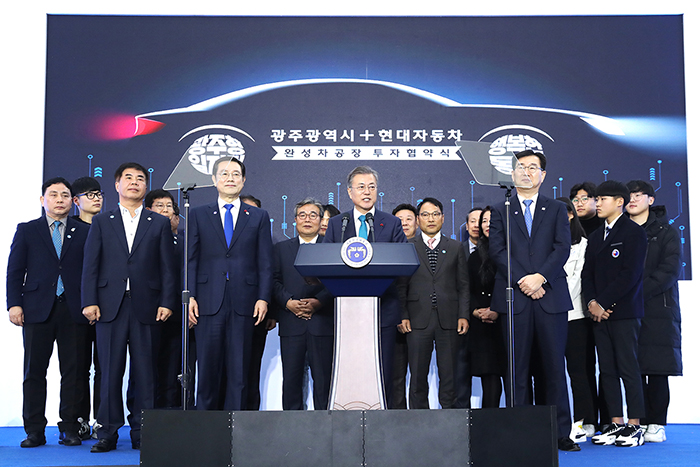
President Moon Jae-in (center) on Jan. 31 expresses his congratulations at Gwangju City Hall, where the municipal government and Hyundai Motor Company held a ceremony for signing their deal finalizing the Gwangju job project. (Cheong Wa Dae)
By Xu Aiying and Yoon Sojung
The Gwangju city government and Hyundai Motor Company on Jan. 31 concluded an agreement to implement the Gwangju job project, which is considered a win-win venture for both labor and management.
The signing ceremony took place at Gwangju City Hall with 400 people attending, including Hyundai staff and officials from both the city and central governments.
President Moon Jae-in also attended the ceremony, expressing hope for the project's success and promotion nationwide.
"The government will spare no effort to make the project a success and spread it across the nation," he said, adding, "If any region adopts the Gwangju job project model through agreement between labor and management, the government will actively support them."
The joint venture between Gwangju and Hyundai will produce cars in the city under the world's first investment model initiated by a private company and a local government rather than the central government based on the goal of social integration. Both the city and the automaker will set up a corporate body and work together in the project.
Hyundai will produce at the new factory SUVs with engine capacity of under 1,000cc and provide technical support for the plant’s construction, management, production and quality management, and sales. The facility will be located at Gwangju Bitgrin National Industrial Complex and have an output capacity of 100,000 cars, with completion slated for the second half of 2021.
The municipal government has pledged subsidies and tax breaks within related regulations and legislation so that the plant can secure stability and sustainability faster.
The annual starting income of the plant’s workers will average KRW 35 million based on a 44-hour workweek, with an advanced wage system designed to increase base pay. Gwangju authorities expect the project to create approximately 12,000 jobs, including both direct and indirect employment, after the factory is completed.
xuaiy@korea.kr